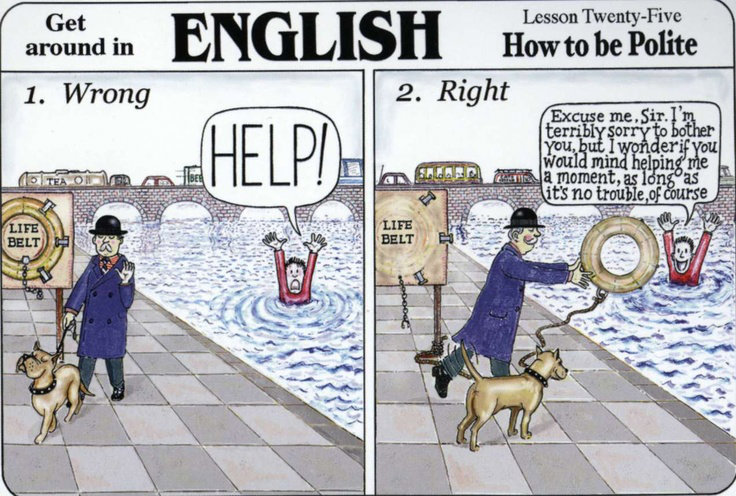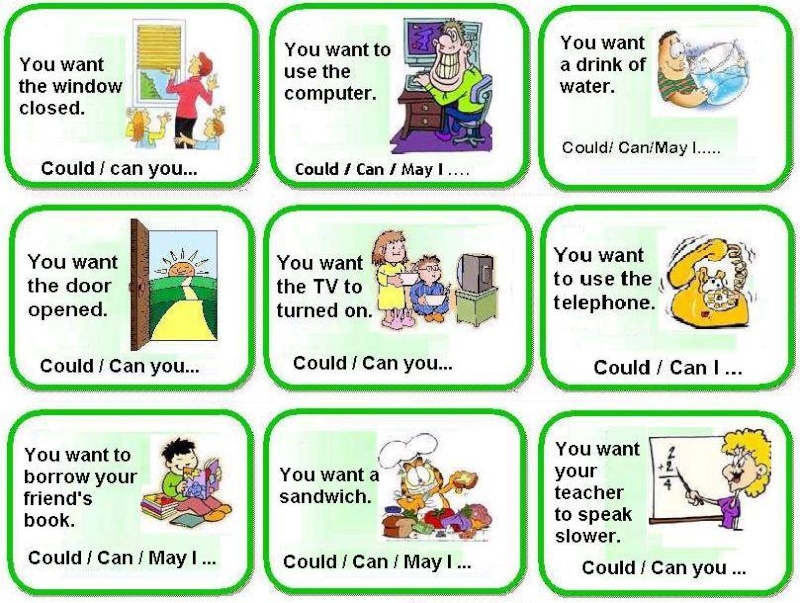Polite Expressions in English: Words, Phrases and Questions to be Kind
Page 1 of 1
 Polite Expressions in English: Words, Phrases and Questions to be Kind
Polite Expressions in English: Words, Phrases and Questions to be Kind
Let’s start with some news that your boss or clients probably won’t want to hear:
- "There will be a delay in the completion of the project."
The speaker has made no attempt here to soften the negative content of the message. A more diplomatic and polite version might look something like this:
- "There might be a slight delay in the completion of the project."
We have added just two words to the sentence, but we have made it considerably more diplomatic. First, we have added the modal verb ‘might’, a technique we discussed in our previous post, and second, the qualifier ‘slight’.
1. Qualifiers:
Qualifiers are words used to modify other words and they increase or decrease the quality signified by those words. Here’s a simple example:
- "It is very hot."
Here the qualifier ‘very’ modifies the word ‘hot’ and increases its quality. If we use qualifiers to decrease the quality of a word, they make great ‘softeners’, words used to soften the tone of our content or convey politeness when we speak. Other examples of qualifiers that can make great softeners are:
a little, a bit, a little bit, slight, slightly, small, one or two.
Consider using these alternative structures when giving your boss or your clients some bad news:
- "We are having problems with the new product."
- "We are having one or two problems with the new product."
- "We will run over budget."
- "We might run slightly over budget."
- "The marketing campaign is behind schedule."
- "The marketing campaign is a little bit behind schedule."
2. Negative Question Forms:
Another way we can make our English more diplomatic is by using negative questions when we want to make a suggestion. Consider this sentence:
- "We should redesign the company logo!"
This sounds quite forceful and direct and you’d probably want to avoid this when speaking to a superior or a client. A more indirect version looks like this:
- "Shouldn’t we redesign the company logo?"
Here we have taken a forceful sounding statement and turned it into an indirect suggestion by adding ‘not’ and changing the syntax to make it into a negative question. Typically, we use shouldn’t, wouldn’t and couldn’t to form this type of question.
- "We must hire a new advertising agency."
- "Couldn’t we hire a new advertising agency?"
- "Wouldn’t it be better to hire a new advertising agency?"
3. Using the Past Continuous Tense:
Another way to make a sentence less direct and more diplomatic is to use the past continuous tense:
- "I hope we can sign the contract today."
- "I was hoping that we could sign the contract today."
Using the past continuous makes the sentence sound more hypothetical and tentative, and therefore less direct and is a great technique for injecting diplomacy and politeness into your English. Here are a few more examples:
- "I think we need to hire more employees."
- "I was thinking we need to hire more employees."
- "I aim to finish this project by the end of the month."
- "I was aiming to finish this project by the end of the month."
4. The Passive Voice:
Finally, the passive voice is a great way to make your sentences sound more diplomatic:
- "You have broken my computer!"
This active voice sentence is brutally direct and if your aim is to avoid confrontation then you might consider using the passive voice to lessen the emotional impact of the sentence:
- "My computer has been broken!"
Here we are removing the subject (you) from the sentence completely and focusing on the object (the computer) and the action. The effect here is to de-emphasize personal responsibility for the action. Let’s have a look at a few more examples of diplomatic sentences using the passive voice:
- "You said you were going to sign the deal today."
- "It was understood that you were going to sign the deal today."
- "You agreed to lower your fees."
- "It was agreed that you were going to lower your fees."
Now that you have plenty of useful polite expressions, vocabulary and grammatical structures at your disposal, it’s time to start being diplomatic in English!
http://www.myenglishteacher.eu/blog/polite-expressions-in-english-words-phrases-and-questions-to-be-kind/
- "There will be a delay in the completion of the project."
The speaker has made no attempt here to soften the negative content of the message. A more diplomatic and polite version might look something like this:
- "There might be a slight delay in the completion of the project."
We have added just two words to the sentence, but we have made it considerably more diplomatic. First, we have added the modal verb ‘might’, a technique we discussed in our previous post, and second, the qualifier ‘slight’.
1. Qualifiers:
Qualifiers are words used to modify other words and they increase or decrease the quality signified by those words. Here’s a simple example:
- "It is very hot."
Here the qualifier ‘very’ modifies the word ‘hot’ and increases its quality. If we use qualifiers to decrease the quality of a word, they make great ‘softeners’, words used to soften the tone of our content or convey politeness when we speak. Other examples of qualifiers that can make great softeners are:
a little, a bit, a little bit, slight, slightly, small, one or two.
Consider using these alternative structures when giving your boss or your clients some bad news:
- "We are having problems with the new product."
- "We are having one or two problems with the new product."
- "We will run over budget."
- "We might run slightly over budget."
- "The marketing campaign is behind schedule."
- "The marketing campaign is a little bit behind schedule."
2. Negative Question Forms:
Another way we can make our English more diplomatic is by using negative questions when we want to make a suggestion. Consider this sentence:
- "We should redesign the company logo!"
This sounds quite forceful and direct and you’d probably want to avoid this when speaking to a superior or a client. A more indirect version looks like this:
- "Shouldn’t we redesign the company logo?"
Here we have taken a forceful sounding statement and turned it into an indirect suggestion by adding ‘not’ and changing the syntax to make it into a negative question. Typically, we use shouldn’t, wouldn’t and couldn’t to form this type of question.
- "We must hire a new advertising agency."
- "Couldn’t we hire a new advertising agency?"
- "Wouldn’t it be better to hire a new advertising agency?"
3. Using the Past Continuous Tense:
Another way to make a sentence less direct and more diplomatic is to use the past continuous tense:
- "I hope we can sign the contract today."
- "I was hoping that we could sign the contract today."
Using the past continuous makes the sentence sound more hypothetical and tentative, and therefore less direct and is a great technique for injecting diplomacy and politeness into your English. Here are a few more examples:
- "I think we need to hire more employees."
- "I was thinking we need to hire more employees."
- "I aim to finish this project by the end of the month."
- "I was aiming to finish this project by the end of the month."
4. The Passive Voice:
Finally, the passive voice is a great way to make your sentences sound more diplomatic:
- "You have broken my computer!"
This active voice sentence is brutally direct and if your aim is to avoid confrontation then you might consider using the passive voice to lessen the emotional impact of the sentence:
- "My computer has been broken!"
Here we are removing the subject (you) from the sentence completely and focusing on the object (the computer) and the action. The effect here is to de-emphasize personal responsibility for the action. Let’s have a look at a few more examples of diplomatic sentences using the passive voice:
- "You said you were going to sign the deal today."
- "It was understood that you were going to sign the deal today."
- "You agreed to lower your fees."
- "It was agreed that you were going to lower your fees."
Now that you have plenty of useful polite expressions, vocabulary and grammatical structures at your disposal, it’s time to start being diplomatic in English!
http://www.myenglishteacher.eu/blog/polite-expressions-in-english-words-phrases-and-questions-to-be-kind/

Vincent Law- Advanced Fluency

- Posts : 1537
Join date : 2011-12-22
Age : 50
Location : Philadelphia

Vincent Law- Advanced Fluency

- Posts : 1537
Join date : 2011-12-22
Age : 50
Location : Philadelphia

Vincent Law- Advanced Fluency

- Posts : 1537
Join date : 2011-12-22
Age : 50
Location : Philadelphia

Vincent Law- Advanced Fluency

- Posts : 1537
Join date : 2011-12-22
Age : 50
Location : Philadelphia
 Similar topics
Similar topics» 99 English Phrases to say 'I love you'
» Business English: Useful Expressions
» ENGLISH LANGUAGE - Eight phrases we owe to William Shakespeare
» ENGLISH LANGUAGE - Number of words in English
» How many English words are verbs?
» Business English: Useful Expressions
» ENGLISH LANGUAGE - Eight phrases we owe to William Shakespeare
» ENGLISH LANGUAGE - Number of words in English
» How many English words are verbs?
Page 1 of 1
Permissions in this forum:
You cannot reply to topics in this forum




